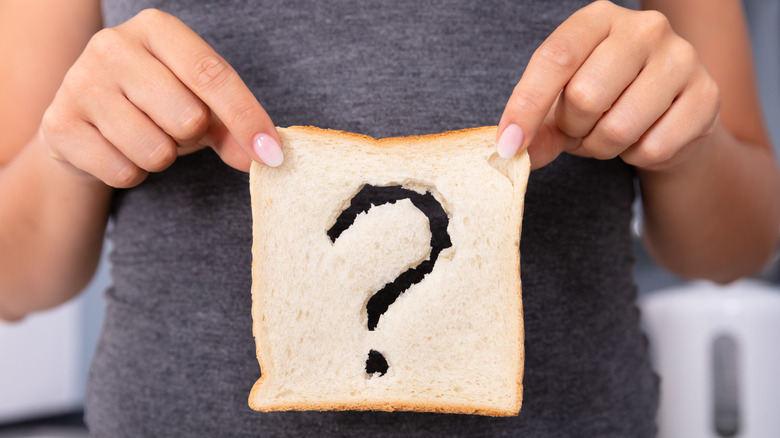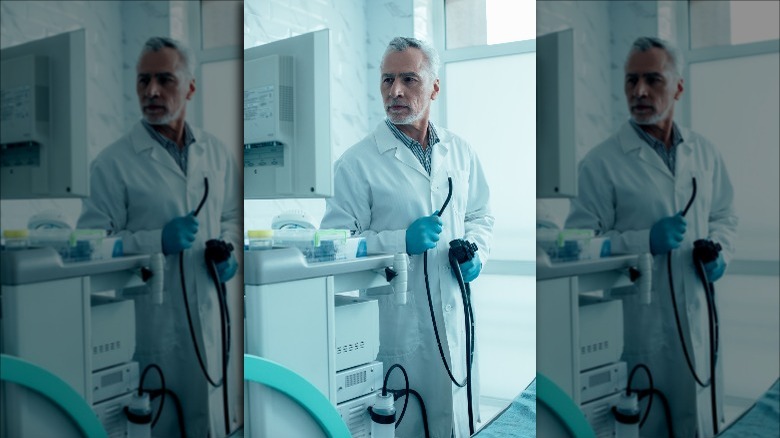Celiac Disease Explained: Causes, Symptoms, And Treatments
For better or worse, gluten-free eating has become a mainstay in diet culture. While the notion of wheat being flat-out bad for you has been aggressively debunked, there is a small percentage of the population that truly needs to avoid gluten for more than just fad-dieting purposes (via WebMD). Celiac disease is an autoimmune disease that flares up when someone with the condition consumes gluten-containing products. Often, avoiding bread isn't enough — but we'll get into that later. The Celiac Disease Foundation states that 1 of every 100 people has this autoimmune disease. If left untreated, celiac disease can lead to negative health consequences later in life.
We all know someone who doesn't eat gluten for one reason or another. You may have even wondered if cutting gluten out of your diet is something you should consider. Curious to know what causes celiac disease, how it is best treated, and how it presents in the human body? Let's get started.
What is celiac disease?
If a person with celiac disease consumes even trace amounts of gluten, it can wreak havoc on their digestive system. When people with celiac disease consume gluten, their bodies react with an immune response. This can sometimes feel the same way that fighting off a cold can feel, but often with neurological effects such as brain fog as well. (via Verywell Health). In addition to the immune response, consuming gluten can severely damage the lining of the intestines (via WebMD).
The gluten particle essentially acts as a ninja star being thrown down the intestines. The villi, or little hairs that line the intestines, become damaged as the gluten protein moves through. Damaged villi can result in absorption and malnutrition issues. It is important to note that true celiac disease is not the same as having a gluten intolerance. Those who live with gluten intolerance may experience similar physical symptoms, but there is no evidence to support that these individuals have immune responses or intestinal damage after consuming gluten (via WebMD).
What even is gluten?
People with celiac disease cannot eat gluten, as you've probably already heard. Much to the chagrin of Italian fathers everywhere, yes, that does include pasta. Mi dispiace, papà. Gluten is the binding protein found in wheat, barley, rye, and other grains. Gluten is what gives bread its elasticity and irreplicable texture (via WebMD). The lack of gluten in gluten-free products is why they are often dense, dry, and best consumed with a hefty glass of almond milk.
Not only found in bread, gluten also lurks in surprising locations. It is in beer, soy sauce, some candies, and many cereals. Because gluten is the binding protein, it is inherently sticky and helps foods hold their shapes (via The Celiac Disease Foundation). The stickiness is also part of the reason why adhering to a celiac-grade gluten-free diet is complicated. In most cases of celiac disease, cross-contamination can cause illness and other gluten-related issues.
Yes, you read that right: People with celiac disease cannot eat food that has come into contact with gluten because of how damaging the gluten particles are to their systems, confirmed Beyond Celiac.
How do you get celiac disease?
Celiac disease is not contagious, according to integrative medicine and gut health expert Dr. Amy Burkhart. "Celiac disease is an autoimmune condition and is not infectious," Burkhart wrote in an article for The Celiac MD. "It can't spread from person to person." While this much has been confirmed, the leading experts are unsure as to what exactly causes celiac disease, although genetics are likely a factor (via Medline Plus).
There are more than 80 types of autoimmune diseases and they all have one thing in common: They all occur when the body's immune system attacks and destroys healthy tissues. In some cases of autoimmune diseases, the body reacts to a trigger that is virtually unknown, WebMD explained. The trigger for celiac disease, however, is known to be gluten. This is why it is harmful for people with celiac disease to continue eating gluten; it puts the body into a perpetual state of war against itself.
Genetics and risk factors
While the direct cause of celiac disease is unknown, scientists have identified a few key risk factors that might contribute to celiac disease. These risk factors include type 1 diabetes, Down syndrome, Turner syndrome, Addison's disease, autoimmune thyroid disease, microscopic colitis, and others, according to the Mayo Clinic. Scientists have been able to identify that celiac disease most commonly affects Caucasian people (via Reuters).
Additionally, if you have a direct family member with celiac disease, you are more likely to develop it (via Mayo Clinic). In fact, according to the Celiac Disease Foundation, if you have an immediate family member with celiac disease, your chances of having it are 1 in 10.
"For many adults, celiac disease lies dormant, without symptoms, until triggered by another health-related event," Premiere Health explained. This can include severe stress or a traumatic experience. This is true for many autoimmune diseases. Only recently have studies started investigating potential links between childhood trauma and the occurrence of celiac disease (via Gluten-Free Living).
Does celiac disease affect children?
Celiac disease can affect children. "Many kids are diagnosed with it when they're between 6 months and 2 years old, which is when most kids get their first taste of gluten in foods," Nemours confirmed. The far-reaching repercussions of celiac disease can influence the way a child develops; this is why it is so important to obtain a proper diagnosis if you suspect something is amiss in your child's system (via Mayo Clinic).
Since untreated celiac disease directly results in intestinal damage and distress, children who are undiagnosed and thus continue to eat gluten may be unable to absorb the nutrients in their food. The inability to absorb nutrients can lead to a host of problems including but not limited to neurological complications, delayed puberty, weight loss, irritability, loss of tooth enamel, learning disabilities, lack of muscular coordination, and seizures. Notably, the effects of celiac disease on infants is sadly "failure to thrive," according to the Mayo Clinic. If you think your child may have celiac disease, consult their pediatrician.
What are the symptoms of celiac disease?
As with so many health-related things, the symptoms of celiac disease are not one size fits all. We hope you are ready to talk about poop, because there is no turning back now.
The symptoms of celiac disease vary slightly between children and adults, with children presenting far more gastrointestinal issues than adults. That doesn't mean that adults don't experience stomach troubles, though. In addition to diarrhea, constipation, bloating, gas, nausea, and vomiting, adults often experience fatigue, anemia, joint pain, loss of bone density, mouth ulcers, skin rashes, and reduced spleen function (via Mayo Clinic).
Some symptoms that children experience are similar to those that adults experience. Children with celiac disease may also experience a swollen belly, chronic diarrhea, and pale, foul-smelling stools, according to WebMD. You know your body best and if you have children, you are likely very-well tuned into their bodily cues as well. The experts at the Mayo Clinic encourage people who experience symptoms for more than two weeks, or perceive symptoms in their children, to contact their doctors. They reiterate that most people should absolutely chat with their doctor before saying sayonara to bread forever.
Is it curable?
At this point in history, celiac disease is not curable. Additionally, there are no drugs to aid in decreasing the intensity of celiac disease. The only notable treatment is a gluten-free diet. Yes, cutting out gluten is a necessary part of life post-diagnosis.
On the surface, going gluten free means omitting bread, pasta, crackers, beer, and baked goods. The subtleties of this lifestyle are more nuanced than that, though. While people's sensitivity can vary, people with celiac disease should carefully read every food label before they consume a product because many naturally gluten-free foods are processed on equipment that also processes wheat (via WebMD). Upon eating gluten-contaminated food, this could mean days spent feeling crappy as your immune system works to find its way back to homeostasis.
Dining out can also present some challenges. While many establishments are wising up and beginning to include menu items devoid of gluten, for celiacs eating out is a real enter-at-your-own-risk situation. Cross-contamination abounds in restaurants, making it difficult to manage celiac disease. However, if a strict gluten-free diet is followed with a keen eye for detail, symptoms can be managed and intestinal healing can occur (via Mayo Clinic).
Are there long-term health consequences in people who have celiac disease?
The answer to this question is an unfortunate and resounding "yes." There are long-term health consequences in people with celiac disease, especially if they don't know that they have it. Researchers believe that less than 20% of people with celiac disease get the right diagnosis (via WebMD).
Long-term malnutrition can lead to less-than-optimal health, which can open up pathways for new diseases and complications to manifest. These complications can include anemia, osteoporosis, hair loss, and small bowel ulcers. While the research is scant, experts have also determined enough of a link to claim that celiac disease is related to some cancers, including lymphoma. However, Medical News Today pointed out that the association is rare and that most people with celiac disease do not develop cancer. Additionally, the site revealed that a gluten-free diet is one way to reduce the likelihood of developing lymphoma if you have celiac disease.
The malabsorption of nutrients can play a role in female infertility. If your body is unable to absorb adequate vitamin D and calcium, you may run the risk of developing reproductive issues and having miscarriages. Furthermore, people can develop refractory or nonresponsive celiac disease, which can lead to further health issues (via Mayo Clinic).
Is celiac disease the same as a food allergy?
Since celiac disease is an autoimmune disease, it is not the same as having an allergy to gluten. The Mayo Clinic estimates that up to 3% of adults have food allergies, which is higher than the 1% of the population with celiac disease. The milder symptoms of a food allergy include hives, eczema, itching of the mouth, trouble breathing, and the occasional gastrointestinal symptom. The more severe and well-known side effect of consuming something that you are allergic to is anaphylaxis. Anaphylaxis is identifiable by its rapid onset, the restriction of airways, racing pulse, and extreme dip in blood pressure. Anaphylaxis requires immediate medical attention.
Food allergies differ from celiac disease in that when the substance is consumed, a true allergen will spark the release of immunoglobulin E to neutralize the allergen. When you consume the allergen again, your body will release histamines as a reaction, which is what can lead to anaphylactic episodes. While both food allergies and celiac disease are caused by overreactive immune function, the mechanisms that drive each ailment and their repercussions differ (via Mayo Clinic).
How is celiac disease diagnosed?
Celiac disease is sneaky. It is incredibly tricky to diagnose and, as such, it is often misdiagnosed, leaving those who have it without concrete answers.
To diagnose celiac disease, doctors guide their patients through some tests. A blood test is often ordered to look for particular antibodies. "Almost everyone with celiac has them in their blood at higher-than-normal levels," according to WebMD. However, if someone experimentally cuts out gluten for a while, the antibody blood test won't be able to determine if that person has celiac disease. If you want to receive a blood test to check for celiac disease, chat with your doctor and avoid cutting out gluten until advised. This will likely make the testing process unfold a bit more smoothly.
Patients who are suspected to have celiac disease may also be advised to undergo an endoscopy. "They'll insert a scope with a camera through your mouth, down your esophagus, and into your intestinal tract," explained WebMD. The physician may also perform a biopsy of your small intestine tissue during this procedure. If the biopsy shows damaged villi, celiac disease is likely.
Can people with celiac disease live normal lives?
People with celiac disease can absolutely live normal lives! The sheer amount of gluten-free products on the market today can keep celiacs happy day in and day out (via Medical News Today). Once people with celiac disease determine what they can and cannot eat and how to plan ahead, they are only one step away from becoming a bodhisattva of #glutenfreeliving.
To complete the final stage of your newly diagnosed lifestyle, you may need to get comfortable discussing bodily functions — namely, bowel movements and gas — with your medical team and get used to making alterations to meals when dining out, but you can certainly have a good quality of life.
"After adequate treatment and regular medical follow-up, the prognosis is excellent," the Cleveland Clinic confirmed. If left untreated, though, celiac disease can lead to major complications. Nevertheless, "the disease is rarely fatal — most people who are diagnosed and who do not eat gluten do well," the publication continued.












